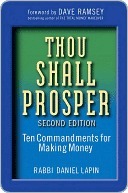More on this book
Community
Kindle Notes & Highlights
Thomas Edison said it pretty well: “Opportunity is missed by most people because it is dressed in overalls and looks like work.”
The Talmud advises worshippers in the Jerusalem temple who wish to increase their wealth to pray facing the south, toward the direction of the table that held the ceremonial bread, because the bread was mystically linked to money. The mystical master and thirteenth century Kabbalist, Nachmanides, wrote of the ceremonial temple table and its showbread: “From the showbread upon the table came material blessings and economic abundance to all Israel.”8 He described the bread as a sort of economic kick start. (Strangely enough, even today, the idea linking money and bread lingers with us as we
...more
Foolishly claiming that business is about greed merely confirms the growing cultural conviction that business is, at root, fundamentally immoral—that even if commerce may be necessary for a healthy economy, it is a necessary evil.
True, the state’s increased role in times of crisis is a natural reaction to market setbacks. Instead of streamlining market mechanisms, some are tempted to expand state economic intervention to the greatest possible extent.”
However, if you are a businessperson causing even the slightest tinge of discomfort to others while in pursuit of profit and wealth, you will immediately and unconditionally be condemned as immoral.
“Capitalism is about extracting profit from others, and for that reason usually raises ethical issues.”34 How do you extract profit from others without being arrested for theft? Nobody extracts profit from anyone. Ordinarily one sets a price for the goods or services one wishes to sell. Customers either materialize and purchase those goods or services, or they don’t. If they do, one earns a profit. If customers spurn your offering, then you fail to make a profit. Where does the extract come in? It doesn’t, of course, but using the word betrays what the good professor really thinks of business.
...more
conviction that humans are uniquely spiritual creatures touched by the finger of God that was partially responsible for astounding Jewish economic success.
He can and must consider himself to be in business. All he must do is view his employer as one of his customers.
Teach them to see themselves as independent business professionals.
They must learn how to accept not only direction but also criticism without responding resentfully or mutinously.
By understanding your own motivations, you can far more easily determine why you do things and how to change your conduct.
“Turn away from doing evil, and then do good, seek and pursue total completion.”
What causes anger? Arrogance.
Anger is the emotion you feel when you are not being treated with what you consider to be appropriate respect.
Mr. Smith gives you the opportunity to earn it for yourself, he is doing you an even greater favor. Possessing skills that can enhance his business allows you to earn the money as his employee while retaining your self respect. One of the gigantic economic advantages that Judaism confers on its devotees is this deep, internalized conviction that making money is largely the consequence of a mutually beneficial interaction with other human beings.


